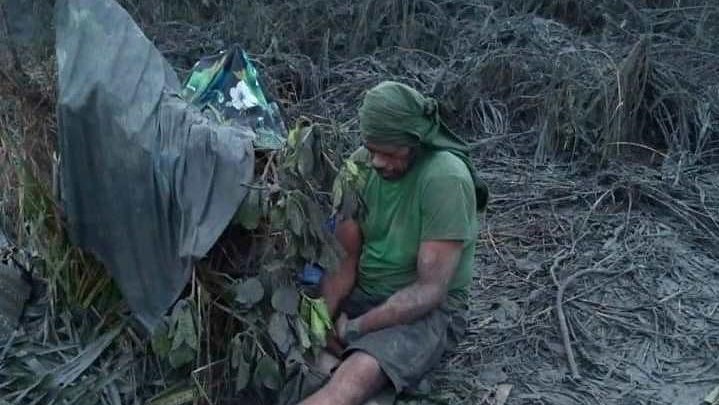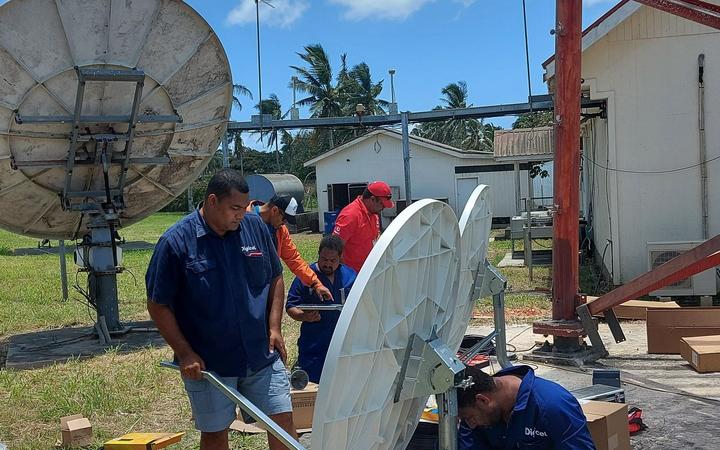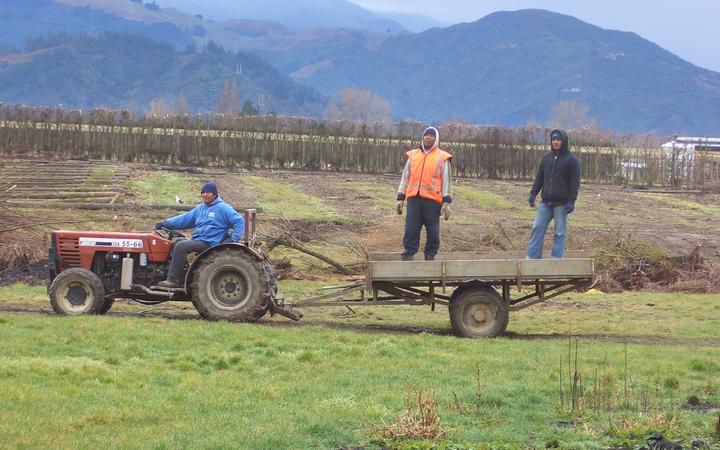Tonga eruption: Seasonal workers hit hard – report
Friday 4 February 2022 | Written by RNZ | Published in Regional, Tonga

The aftermath: Timote Ake, lost his house and all his belongings on Mango Island, Ha'apai. Photo: Supplied / Piokalafi Fakaosi
When the Hunga Tonga-Hunga Ha'apai Volcano erupted on 15 January 2022, there were some 150,000 Tongans living overseas - 5,000 of them employed across New Zealand and Australia's Pacific temporary labour schemes.
The eruption triggered a tsunami that destroyed villages, resorts and infrastructure. It also knocked out communications for the South Pacific nation of about 105,000 people.
Three lives were lost as a result of the disaster.
A report by a group of researchers has revealed that the breakdown of communications early in the aftermath of the disaster meant many seasonal workers in Aotearoa and Australia were "left in the dark, not knowing whether their families were safe or not."
Some of these labourers have still not been able to make contact with loved ones - more than two weeks after the eruption.
The team of researchers included New Zealand-based Charlotte Bedford, and Telusa Tu'i'onetoa, Rochelle Bailey and Gemma Malungahu - all from the Department of Pacific Affairs at the Australian National University.
Their report found that several days after the disaster, Digicel was successful in reconnecting international phone coverage and 2G connectivity, and Tonga Communications Corporation restored wi-fi connectivity.
"From Friday 21 January, TPG Telecom which includes Vodafone, Kogan and Lebara brands, offered free calls from Australia to Tonga for two weeks," it stated.
"But as communication lines have slowly resumed, not all seasonal workers have had the same opportunities to connect with their families.
"Some still struggling include those with family members who do not have a mobile phone, or whose phones have been lost or damaged in the disaster."
Many Tongan seasonal workers have been absent from home for much longer than usual due to Covid-related travel restrictions, with some now in New Zealand and Australia for more than two years.
Absence from home for prolonged periods of time, and when a disaster unfolds, can have negative impacts on the mental health of seasonal workers.

"Not being able to provide direct physical and emotional support to their families, and fulfil social obligations can be particularly challenging for seasonal workers," the report stated.
"These may lead to feelings of helplessness, loneliness, depression and isolation, as well as problems such as not sleeping well, increased fatigue and increased alcohol use.
"The limited communications with loved ones may lead to further stress and anxiety.
"Appropriate mechanisms to support Tongan seasonal workers - such as counselling services, and access to medical and social support structures, such as churches - are needed now more than ever."
In 1839, King George Tupou I committed his country, his people and future generations to God's protection, when he proclaimed 'God and Tonga are my inheritance'.
The central role of the Christian faith in Tonga is articulated in this motto, which is also stated on the Tongan coat of arms.
The communities of the Tongan diaspora, including seasonal workers, continue to pray for the safety of their families.
"The solidarity of the global Tongan diaspora is visible via Tongan social media, TV and radio station platforms, that mobilise the community in prayer, offering words of encouragement and playing uplifting songs of worship, and providing solace to the Tongan diaspora.
"The spiritual health and well-being of seasonal workers is helping their resilience during these treacherous times."

Many seasonal workers who remain in New Zealand or Australia in full-time work are in a strong position to financially support their families in Tonga.
Financial and material remittances from seasonal workers and other members of the diaspora can assist with disaster relief and resources to rebuild.
There are benefits and challenges around sending remittances during and after natural disasters, the report stated.
"Remittances can provide immediate financial relief, and contribute to both medium- and long-term recovery.
"But there is the question of whether systems are functioning sufficiently to process thousands of remittance requests.
"The hidden costs associated with exchange rates and transfer fees vary between different money transfer systems; it pays to 'shop around' for the most value-for-money transfers."
For families who have lost their identification documents in the disaster, receiving remittances will be difficult.
However Western Union's online money transfer system, KlickEx Pacific, and remittance transfers to Tonga via banks are once again operational.

Some seasonal workers in New Zealand are buying supplies to be shipped from Auckland to Tonga while their colleagues in Australia are sending money to relatives in New Zealand to do the same, the report found.
"Churches in New Zealand such as the Mormons have also been actively fundraising and organising containers of food and emergency supplies to be shipped to Tonga. But with New Zealand in the red traffic light setting since 23 January, there may be some delays with shipments.
"There are also anticipated delays with delivery of supplies into Nuku'alofa, due to significant damage from the tsunami to the country's main wharf."
Due to the damaged infrastructure across the nation, returning to Tonga is not currently an option for the islanders.
In New Zealand, Tongan RSE (Recognised Seasonal Employer scheme) workers have been encouraged to remain in the country and keep working. Australia will probably encourage its seasonal workers to do the same.
How this will affect Tongan seasonal workers who were due to return home before the eruption remains unknown.
"Concerns have been raised that mass repatriation of workers to Tonga would place an additional burden on limited resources, such as safe drinking water, food supplies and medication," the report stated.
"Resuming quarantine processes will be challenging due to damage to quarantine facilities, and the need to prioritise efforts for disaster relief and recovery."

First batch of RSE workers arrive in NZ post-eruption
The report found that mobilising diaspora resources and aid is a better way of supporting families back home.
Meanwhile, 32 Tongans arrived in New Zealand this week to join the Recognised Seasonal Employers (RSE) Scheme.
An Air New Zealand flight left the Tongan capital Nukua'lofa on Tuesday and arrived in Auckland with passengers and cargo from the island.
Tonga went into lockdown from 6pm on Wednesday after port workers tested positive for Covid-19.
The Government confirmed that the two cases of Covid-19 were detected through routine testing at the wharf in Nuku'alofa.
There are 800 Tongan labourers in New Zealand's Recognised Seasonal Employers (RSE) Scheme.
Tonga joined Australia's Pacific Labour Scheme in 2019. Prior to that, Tonga had participated in the Seasonal Worker Programme for a number of years, providing almost half of the 31,000 workforce since 2012.














































